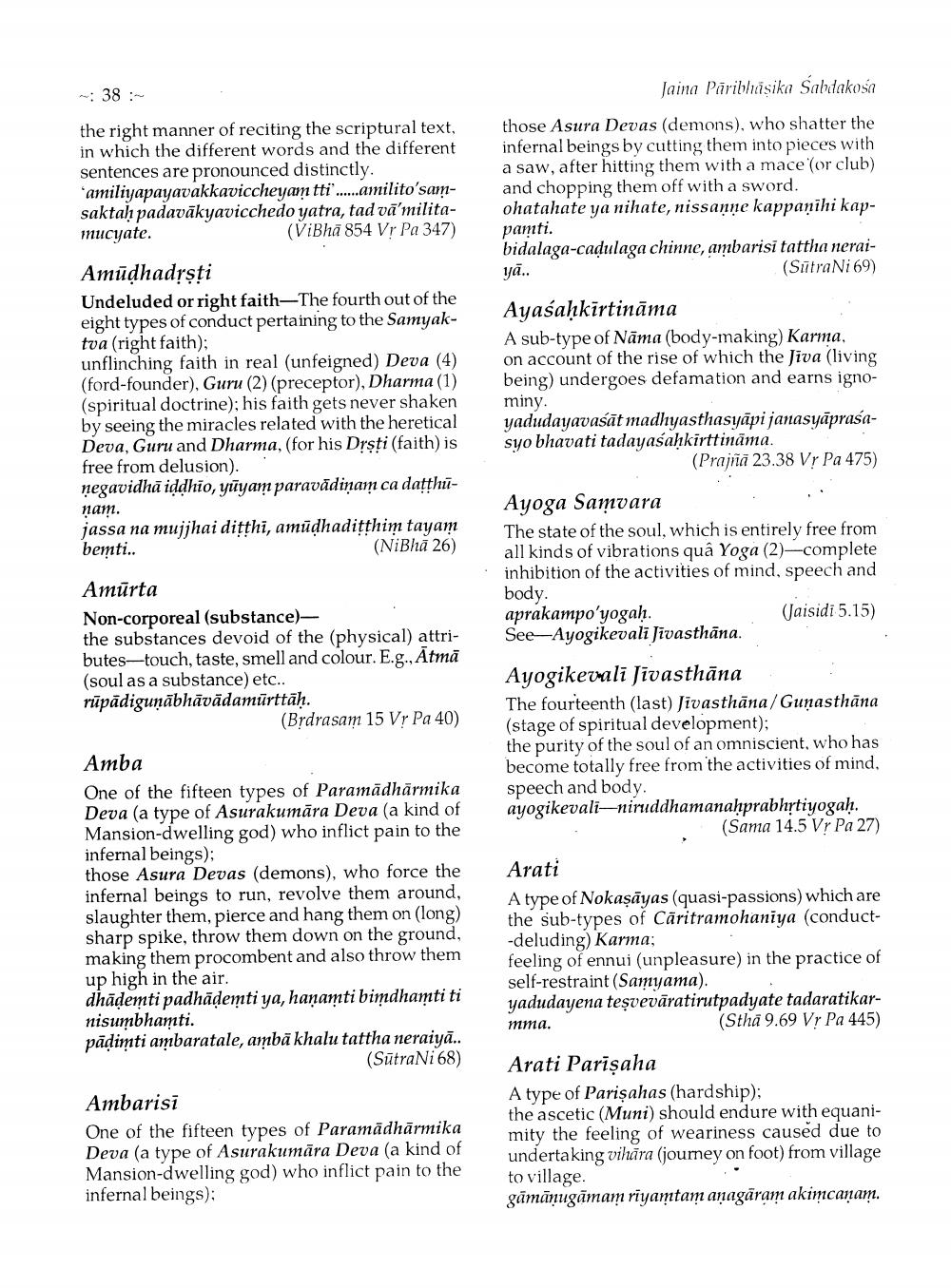________________
-38:
the right manner of reciting the scriptural text, in which the different words and the different sentences are pronounced distinctly. 'amiliyapayavakkaviccheyam tti......amilito'samsaktah padavākyavicchedo yatra, tad vā'militamucyate.
(ViBhā 854 Vr Pa 347)
Jaina Pãribliásika Šabdakosa those Asura Devas (demons), who shatter the infernal beings by cutting them into pieces with a saw, after hitting them with a mace (or club) and chopping them off with a sword. ohatahate ya nihate, nissanne kappaņihi kap
pamti.
bidalaga-cadulaga chinne, ambarisi tattha nerai
(SūtraNi 69)
y...
Amūdhadrsti Undeluded or right faith-The fourth out of the eight types of conduct pertaining to the Samyaktva (right faith); unflinching faith in real (unfeigned) Deva (4) (ford-founder), Guru (2) (preceptor), Dharma (1) (spiritual doctrine); his faith gets never shaken by seeing the miracles related with the heretical Deva, Guru and Dharma, (for his Drsti (faith) is free from delusion). negavidhā iddhio, yūyam paravādiņam ca datthuņam. jassa na mujjhai ditthi, amudhaditthim tayam bemti..
(NiBhā 26)
Ayaśaḥkirtināma A sub-type of Nāma (body-making) Karma, on account of the rise of which the Jiva (living being) undergoes defamation and earns ignominy. yadudayavasāt madhyasthasyāpi janasyāprasasyo bhavati tadayasahkirttināma.
(Prajmã 23.38 Vr Pa 475)
Ayoga Samvara The state of the soul, which is entirely free from all kinds of vibrations quâ Yoga (2)-complete inhibition of the activities of mind, speech and body. aprakampo'yogah.
(Jaisidi 5.15) See-Ayogikevali Jivasthāna.
Amūrta Non-corporeal (substance)the substances devoid of the (physical) attributes-touch, taste, smell and colour. E.g., Atmā (soul as a substance) etc.. rūpādigunābhāvādamūrttāḥ.
(Brdrasam 15 Vr Pa 40)
Ayogikevali Jivasthāna The fourteenth (last) Jivasthāna/Gunasthāna (stage of spiritual development); the purity of the soul of an omniscient, who has become totally free from the activities of mind, speech and body. ayogikevali—niruddhamanahprabhytiyogah.
(Sama 14.5 Vr Pa 27)
Amba One of the fifteen types of Paramādhārmika Deva (a type of Asurakumāra Deva (a kind of Mansion-dwelling god) who inflict pain to the infernal beings); those Asura Devas (demons), who force the infernal beings to run, revolve them around, slaughter them, pierce and hang them on (long) sharp spike, throw them down on the ground, making them procombent and also throw them up high in the air. dhādemti padhādemti ya, hanamti bimdhamti ti nisumbhamti. pādimti ambaratale, ambā khalu tattha neraiyā..
(SūtraNi 68)
Arati A type of Nokaşāyas (quasi-passions) which are the sub-types of Caritramohaniya (conduct-deluding) Karma; feeling of ennui (unpleasure) in the practice of self-restraint (Samyama). yadudayena teşvevāratirutpadyate tadaratikarтта.
(Sthā 9.69 Vr Pa 445)
Ambarisi One of the fifteen types of Paramādhārmika Deva (a type of Asurakumāra Deva (a kind of Mansion-dwelling god) who inflict pain to the infernal beings);
Arati Parişaha A type of Parişahas (hardship); the ascetic (Muni) should endure with equanimity the feeling of weariness caused due to undertaking vihara (journey on foot) from village to village. gāmānugāmam riyamtam anagaram akimcaņam.




